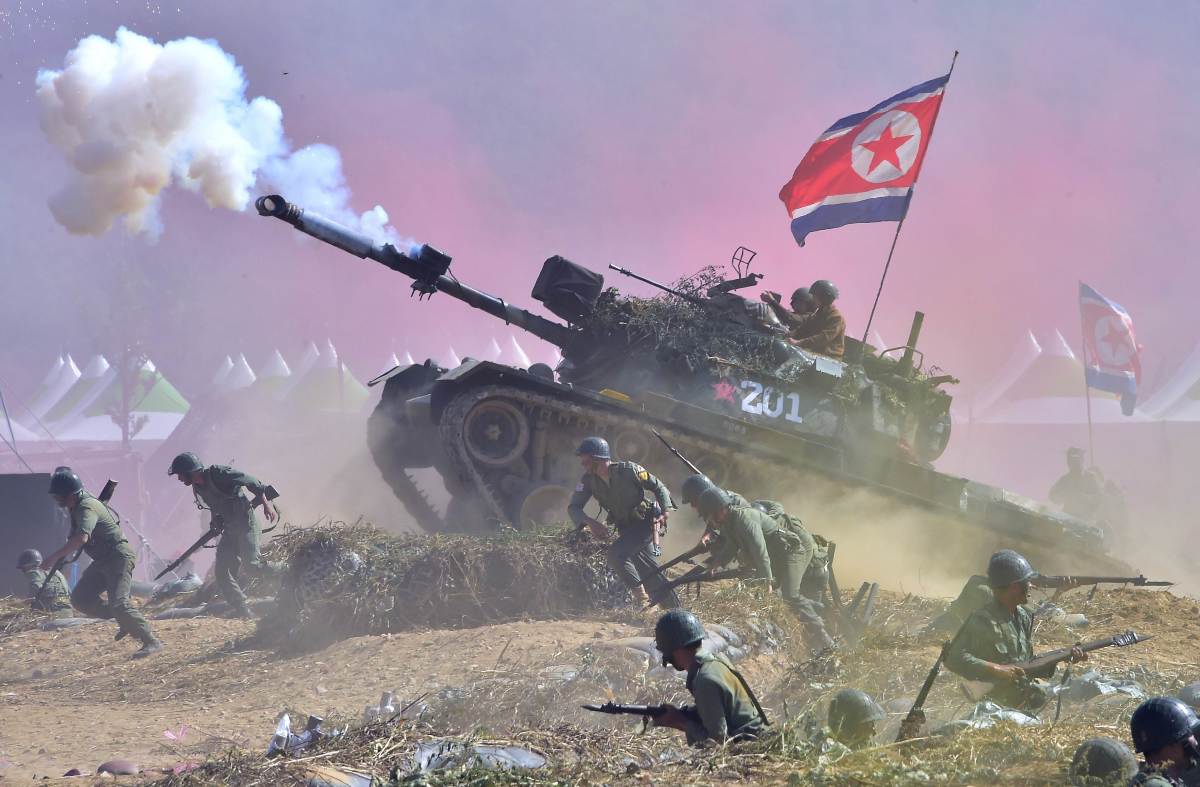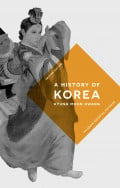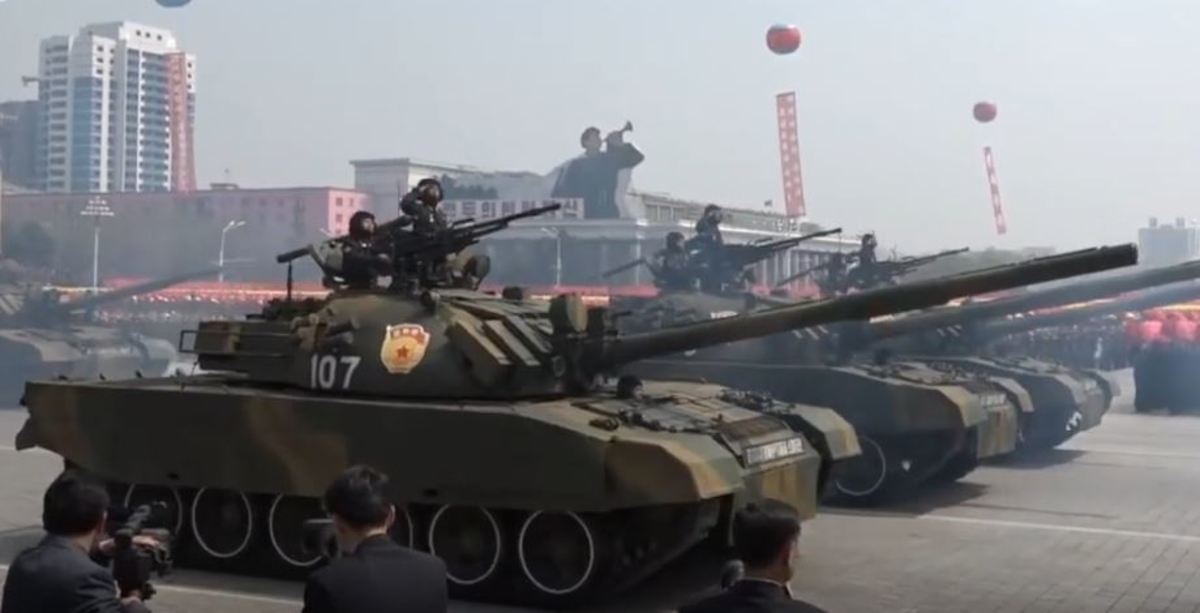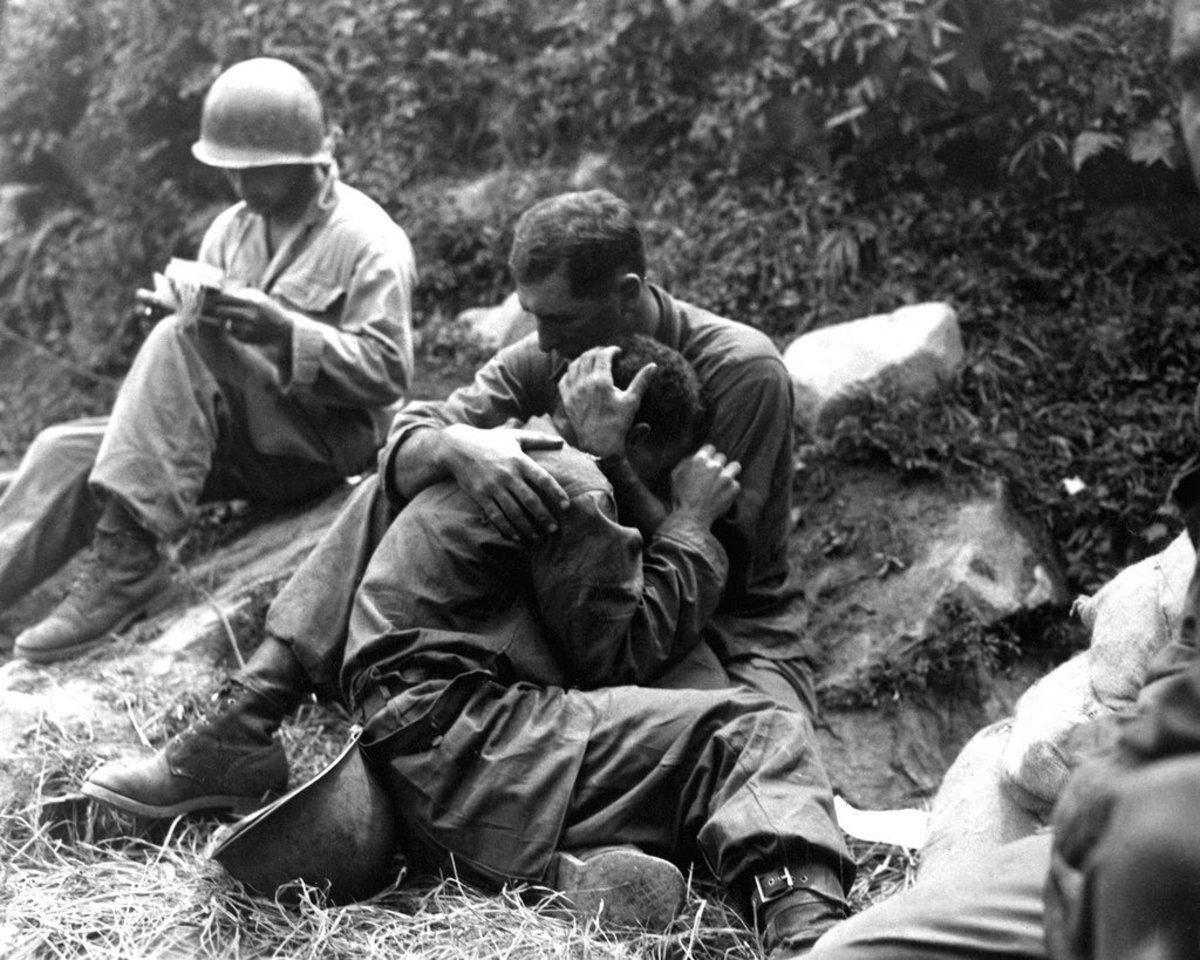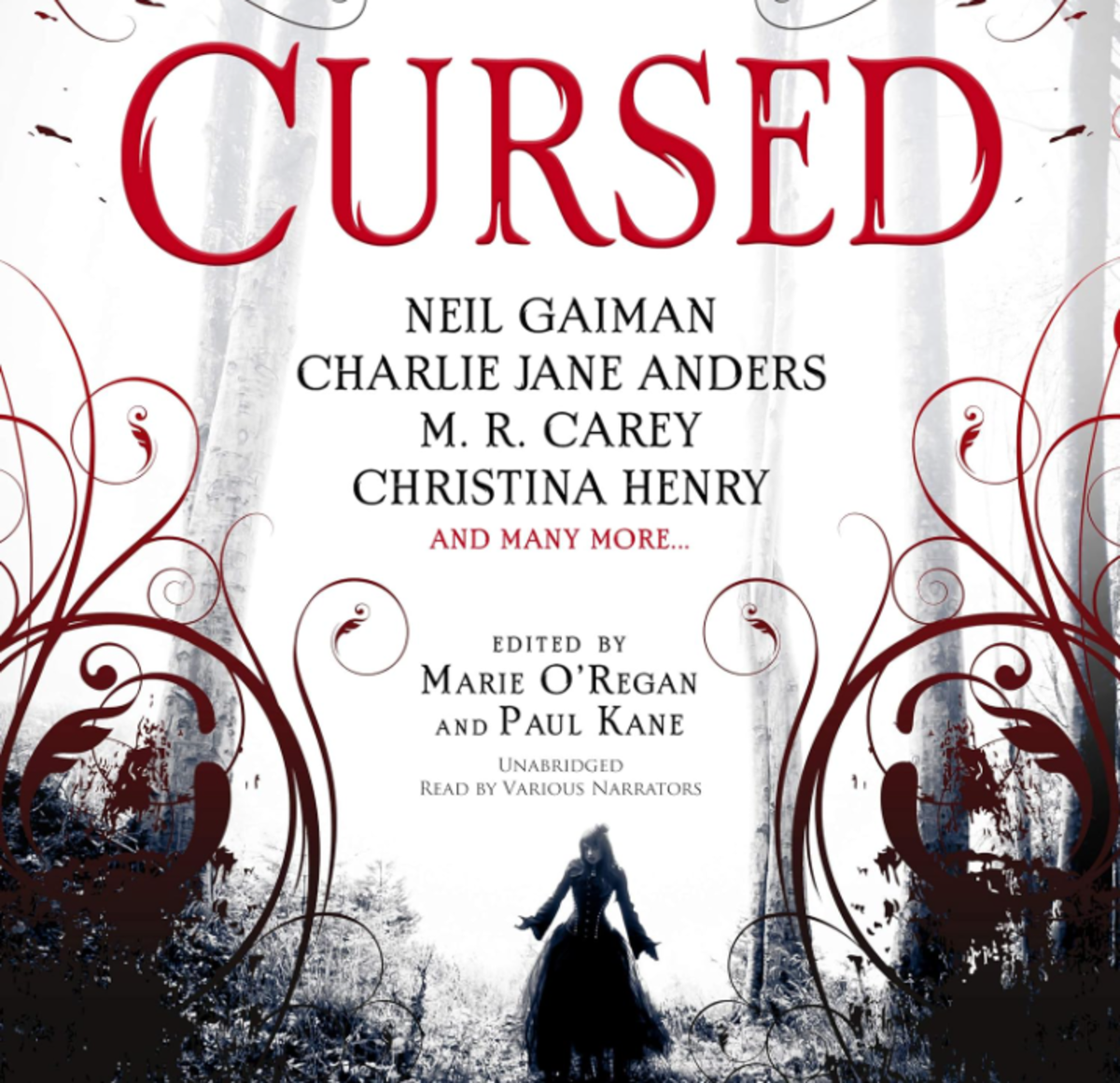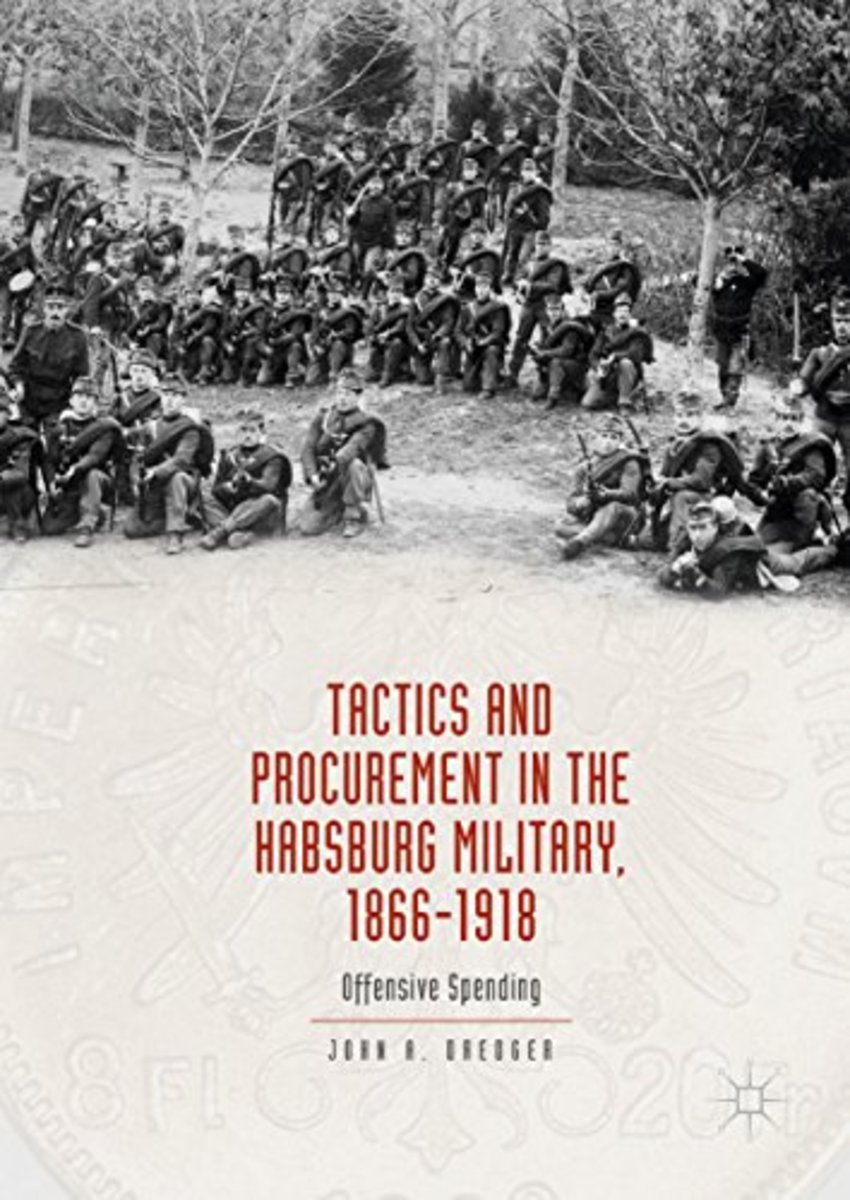Is 2018 the Year the Forgotten War Will Finally Be Remembered?
With Recent Events Surrounding North Korea in the Headlines Many Americans May Not Know That Officially We are Still at War With North Korea
If you're wondering how that could be possible, it's because when the Korean War finally came to a close, no peace treaty was ever reached. An armistice was signed on July 27, 1953...but no peace treat. This means there was no final agreement met to end things and they've remained in a state of limbo ever since.
Very few American Korean War veterans are still alive today...but there are still a few around. And I'm willing to bet they would be willing to provide us with a wealth of information when it comes to the question of how to handle North Koreans.
When these veterans arrived home from what's now known popularly as 'The Forgotten War' very few were given the opportunity to speak about their experiences there. Why? Because not very many Americans even knew that the war was taking place. There was never a successful final outcome. And they simply didn't feel comfortable discussing it. Yet, many historians today believe that it was only because of the heart renching efforts and sacrifices they made in Korea that the world finally saw the fall of Communism.
In this post I'll examine the Forgotten War as seen through the eyes of 2 Dog Company 2nd Battalion Marines...one who's my Dad...as well as a few other amazing recounts written years after the fact by veterans of that war.
I Know That I'm Just A Little Bit Biased :-) But This Book Really Touched My Heart
Running with the Dogs, is one man's moving account of his experiences serving as a Marine in the Korean War. He was a member of Dog Company, also known as Dog 7 for short. (Officially they were referred to as Dog 7, Company D, 2nd Battalion, 7th Marine Regiment, 1st Marine Division.) Try as I might, I doubt I could remember that even if my life depended on it...yet it rolls off the tongue of my 91 year old Dad like it was yesterday!
Fred Frankville served from roughly September 1950 (when he first received his orders) to December 1951 (when he returned home). My Dad served alongside him which is how I came to learn of his book. In it he paints a heartfelt picture of what it was like for the many brave young men who enlisted to fight in this very unpopular war. Some of the hardships they endured are related too including:
- Their daily routine of digging themselves new fox holes.These fox holes provided their only shelter for up to a year and a half's time, the average length of their active duty. Intriguing insights about how they adapted and what measures they employed to make these conditions work for, not against them.
- Surviving on only limited amounts of canned rations (many that were left over from WWII.) This may also shed some light upon the historic rivalry between the Marines & the Army, who by all counts fared much better in the culinary realm.
- The inspiring camaraderie of the Marine's troops...even more remarkable looking back at how these endured for lifetimes...despite, or maybe because of, the horrific circumstances and the gruesome nature of war.
- Colorful glimpses into their daily lives, both work related and personal.
- A few of the true heroes Frankville encountered and many of the brave acts he witnessed.
One reason I think I loved Frankville's book is because it proved invaluable for me to gain a better understanding of what it was like not just for Marines' but for all US military personnel who fought in Korea.
My Brief Synopsis of 'Running with the Dog's'
Fred's Childhood Years
The first few chapters of the book give a poignant and humorous account of Fred Frankville's school age years. It was interesting seeing the connections he draws to how he came to enlist in the Marines.
He paints a vivid picture of his family life and his years growing up in what was then a rural part of the Midwest (it's now a suburb of Chicago.) He was especially influenced by his years spent in a parochial school setting (Catholic.) The parallels he draws between his upbringing by Nuns and his future orientation into the military way of life are insightful.
I was somewhat surprised to find that beyond the insights I gained, these passages entertained me in a way I couldn't have anticipated. That may be because I shared a similar educational background. I suspect that anyone surviving parochial schools of the past, regardless of the generation or denomination, will be equally entertained!
Fred's Enlistment & Active Duty Years
In later chapters, the book recounts the author's experiences in actual combat situations. It's a very frank, accurate, and sometimes horrifying glimpse of life as an infantryman. I was introduced to Frankville's biography by my Dad, a fellow Marine, who also served in Dog Company, but they were in different platoons. They became better friends many years later when a reunion unit for Dog 7 was formed.
Perhaps the Most Personally Moving Autobiography I've Encountered
How I Discovered 'Running with the Dogs'
I discovered 'Running with the Dogs' in a slightly circuitous manner. I began reading Frankville's book when I wanted to understand more of the details about my own Dad's personal military experiences.
This occurred when I finally found myself with some extra time as a new empty nester. I decided to start reading my own Dad's memoirs, which he'd published online. My Dad loves to write. He'd begun working on his memoirs, as well as several other writing projects which initially he undertook just for his family. This was long before personal computers even existed. When he completed something he bound it in the same kind of soft bindings he'd used at work, and then distribute copies to all his children.
Much later he began to share those with the larger world on his new website 'POTPOURRI.' He created POTPOURRI shortly after he retired from the corporate world. This was still long before the concept of blogs came into being. Yet, for all practical purposes Dad's website is a blog. It strikes me now that what Dad has created is really unique, because I spend much of my life currently both writing and reading online and I've yet to encounter another blog that's anything like his. Certainly not one that's actively maintained by a 91 year old.
My Dad has written much more content than I'd realized when I first began reading. I quickly became immersed in his life's stories. While doing that, despite of the sheer magnitude of Dad's written work, I still had questions, which is how I discovered Frankville's autobiography.
I'd been reading my Dad's Korean memoirs, which he published as a set of essays he collectively entitled 'My Korea.' As I read Dad's account, I tried to create a set of reference notes for both myself and for our family's future generations. I included everything from historical frames of reference, to my attempts at understanding the structure of the various branches of the US military armed forces, how they're all intertwined, the various organizational unit structures, and even the hierarchy of ranks. These concepts were all completely foreign, complex, and unclear to me. Yet I felt they were important enough for me to elaborate upon in my supporting 'reference' notes.
I was thrilled to discover Frankville's book, and even more thrilled when I discovered that he had dedicated more than a chapter to my Dad's role in both the war and in their Dog Company unit. Yet even that wasn't enough to completely fulfill my insatiable need to understand that period in time and the impact it had upon not just our family's lives, but thousands of other similar family's too. I continued researching every avenue that I still had questions about, which is what led me to the following books.
I Was Lucky Enough to Find a Great Book Which Explored the Korean War From the Opposition's Perspective
I was reading Frankville's autobiography concurrently with my Dad's personal memoirs, when I happened upon another novel called 'War Trash' by Ha Jin. This book brought to light a compelling argument for a much greater significance of this largely misunderstood war on both the future success of democracy and capitalism, as well as the on ultimate collapse of Communism.
Historians are now recognizing that the circumstances leading up to the Korean War and the war's outcome laid the groundwork for the eventual fall of Communism. It also solidified the newly formed UN's role and purpose both internationally and at home. The significance of both outcomes cannot be overstated!
In addition to those far reaching insights, 'War Trash' by Ha Jin, provides a really fascinating account of a fictitious Chinese soldier's war and POW experience. Although his novel is fiction, it's based on true life facts and incidents of his father's Korean War experiences. Jin's novel helped me to better comprehend the many facets of Communism at that time, it's indoctrination in China, and gave me a better understanding of why it ultimately failed globally.
My Father's Contributions to 'Running With the Dogs'
Frankville recounts a few of my father's memories of key events in Korea. In one chapter, he recalls a complex, yet somewhat obscure operation, known back then as 'Operation Mousetrap'. Mousetrap was part of a larger, month-long counteroffensive action known as 'Operation Killer'. It was conceived of by General Ridgeway, and occurred from early May to early June 1951. In my Dad's Book 'My Korea' Chapter 9 he's written a great description of this memorable battle and has outlined in a diagram the positions of their troops versus their enemies.
Mousetrap's success had a huge personal and emotional impact on the 1000+ allied soldiers who were part of it. I was astonished to find that the event is described in Ha Jin's novel, although in this instance, it was depicted from the enemy's perspective.
My surprise was warranted because, aside from the horrifying memories of those who experienced it, there is almost nothing written about this operation and it's aftermath. Because the Marines who were there had memories that had grown vague with the passage of time, Frankville and many of his fellow soldiers actually began to question whether or not the operation ever really occurred. Yet it was difficult to fathom that it hadn't, since the magnitude of both the operation and it's aftermath was so overwhelming, Therefore reading about it in Jin's novel, helped me to realize that the memories were accurate. Although it's somewhat puzzling why this event isn't really mentioned elsewhere.
After spending some more time researching 'Operation Mousetrap' I've come to realize that Frankville's coverage of it is probably one of the most comprehensive anywhere. Yet, today there are more recounts appearing online that each add a little missing piece of the puzzle. One brief but great was rememberance that provides a wonderful summary of Operation Mousetrap can be found here. Below I've also recreated it in an image.
In a separate chapter of 'Running with the Dogs' my father recounts stories of his experiences while working with the ROKMC (the Republic of Korean Marine Corps - ROK here refers to South Korea). This relatively young branch of South Korea's militia worked closely with the American and UN forces during the Korean War. Shortly after my Dad arrived in Korea, he was named a 'temporary communications liaison' in a newly created post by his new CO...before he even had the opportunity to join up with Dog Company officially. Joint efforts between Dog 7 and an adjoining ROK unit, were strife with difficulties, due to significant language barriers and cultural differences, which resulted in sometimes tragic, but oftentimes humorous, ironic, or endearing situations.
Marzone.com's Recount of Operation Mousetrap
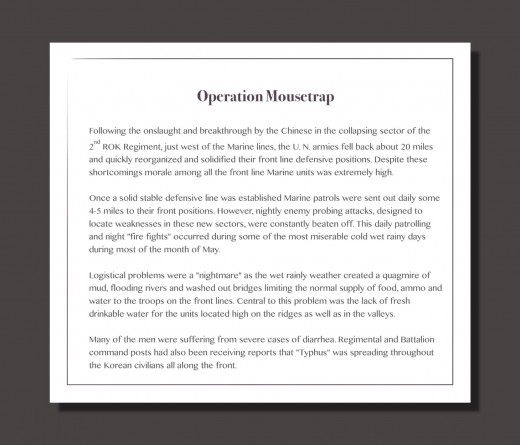
The Aftermath of Operation Mousetrap
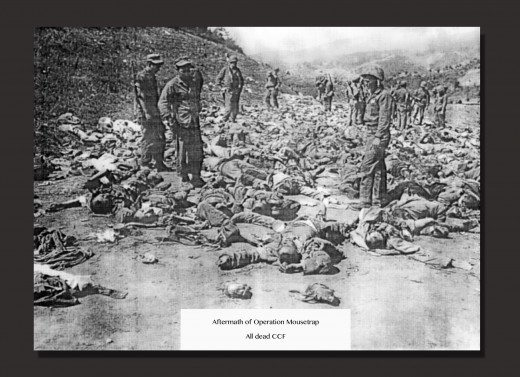
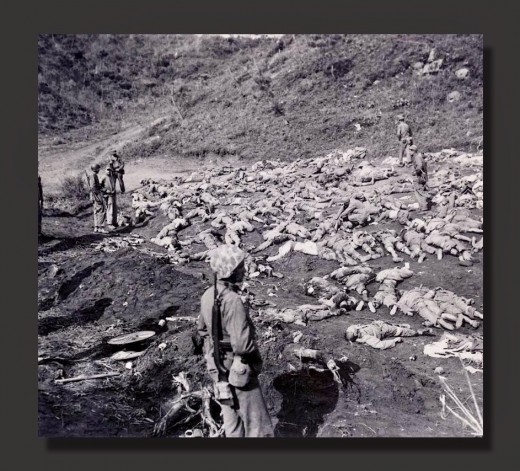
My Dad Turned 92 a Few Weeks Back
Personally, I think it's somewhat miraculous that at his age he still works on his website everyday and still manages to surprise me with some amazing new stories and tidbits of knowledge.
So many from his generation aren't computer literate, and to be frank, Dad struggles sometimes...but I think it's one reason why his mind has stayed so sharp too!
I mention this because what follows is my Dad's own words about the his, Frank's and Dog Company's experiences during the Korean War. Dad is one of a few vets from that war still living. Given today's current relationship with North Korea, the benefits of learning from our father's experience cannot be overstated!
'My Korea' is My Dad's Recollections of Dog Company
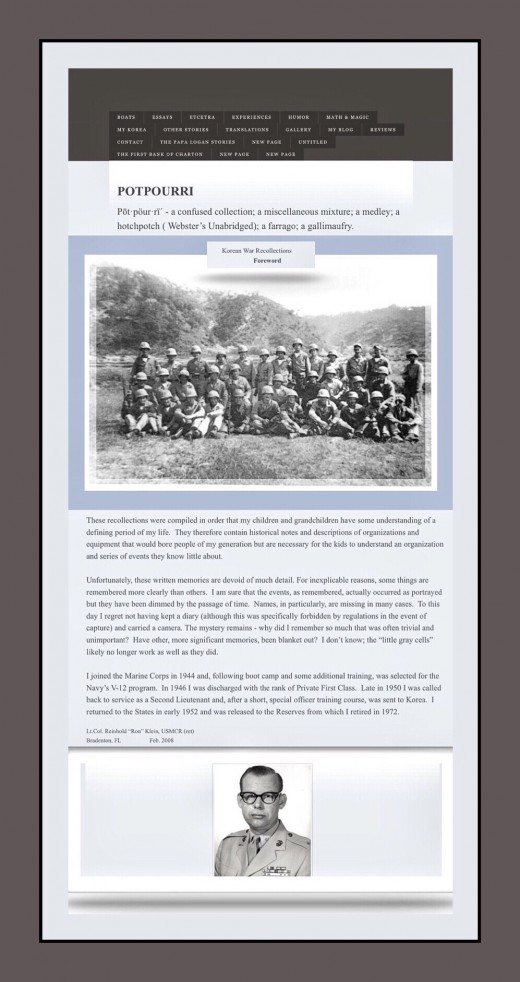
'My Korea' is 14 Chapters Long Excluding the Forward and Afterword
- Chapter 9 is where Dad describes in detail Operation Mousetrap
There is almost no information available online about Operation Mousetrap...yet the size and significance of this battle can't be overstated. For Dad, and his fellow Dog company comrades, this battle has become an indelible part of him. - My Korea - Forward & Introduction
In his Forward Dad introduces himself and gives us some background. He was called into duty as very inexperienced Private, rushed through an intensive Officer's training program at Quantico and landed on Korean soil in a matter of a few months.
I Gave Each of My Siblings & Sons their Own Copies of "Running With the Dogs" for Christmas that year.
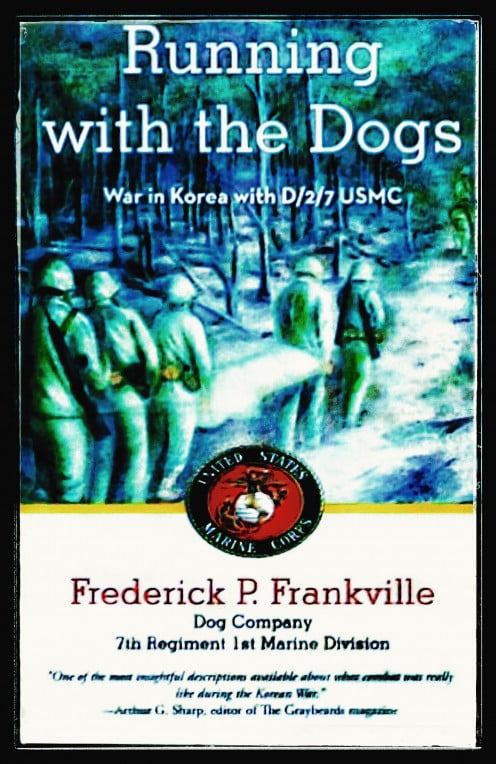
More About Frederick Frankville's Perseverance | & His Battle with Time to Finish 'Running with the Dogs'
Frederick Frankville struggled bravely through his last years, battling monumental health problems. But he was determined to complete his novel. His diligence was rewarded, and his memoirs were finally published and made available at Amazon shortly before he passed away in December, 2013.
His steadfast determination was the reason why he was able to far surpass the life expectancy estimates provided by his doctors, and to achieve this success. Sadly, many members of Dog 7 lost their lives in 2013.
I first learned about Frankville's book during a phone conversation I had with my Dad just a few weeks prior to those events.
I began searching online in an attempt to find a copy of Fred's newly published memoirs. What my father didn't know was that Fred had suceeded in getting his book listed on Amazon. Frankville's success in seeing this project through is a huge victory, but not just for he and his family.
It's also a victory for the hundreds, if not thousands, of families who have parents or grandparents that fought alongside him. By preserving these memories, he's documented a small but incredibly important part of our nation's history that would otherwise have been 'forgotten.' Just as the Korean War itself has been forgotten in both history and by modern society.
The Korean War Should Not be Forgotten | Opportunities to Learn more from Surviving Veteran's Still Exist
The Korean War was labeled as the Forgotten War by U.S.News and World Report in October 1951. Sadly, the moniker stuck. American Histroy Magazine writes about the reasons why in this article from 2014.
When the UN's combined allied forces successfully defended South Korea against the North Korean's invasion, communism's spread was essentially cutoff, geographically, socially and philosophically. Many of the young men who formed the newly communistic Chinese troops, (following the Chinese Civil War), while fighting in huge numbers alongside the North Koreans, were internally conflicted regarding their allegiance to communism. This was the major reason why negotiating an acceptable agreement to end the conflict dragged on for so long.
Indoctrination of communism was already beginning to fail, and thousands of Chinese POW'S struggled with their choices for repatriation (returning to China) versus relocation (to the 'new China', which was really Taiwan). The lessons to be learned from Frankville's memoirs, coupled with the sad truth that the numbers of surviving Korean War veterans are rapidly diminishing, as are our opportunities to learn of their stories first hand, provides a compelling argument for the importance of this work and others like it.
As a member of the baby boom generation, I suspect that my feelings of gratitude for Frankville's efforts are widely shared when others take the time to reflect upon them. His story reveals two kinds of heroism...that which comes from defending our nation's God given liberties, and that which strives to educate and improve upon our lot as a nation. In the later case, we can ultimately learn from our past mistakes, and achieve not just an understanding of, but rather a 'real' sense of shared societal awareness.
It's specifically because of this sense of shared societal awareness, a characteristic which happens to be one of the most defining characteristics of my generation, that this, and the few similar works that are available to us, present such a unique, and timely opportunity to learn more about this somewhat neglected, but hopefully no longer 'forgotten' war.
My Research Ended After I Finished My 8th Biography of the War
While so many of the books I read shed new light on specifics that had been vague for me, and every single story was incredibly moving...there were 3 books which really stood out to me. Those were the ones I recommended my Dad and my siblings read if they wanted to really understand the war from several perspectives. I've removed the 3rd recommendation, which was a really hard choice, because it's also a book that's excellent. But based upon the advice of an email I received from Hubpages, the only reason I can find for why this post was removed from 'Featured' status recently.
Brady is Perhaps the Most Celebrated Author on the Korean War


My Dad & I Really Enjoyed This Surprisingly Warm and Heartfelt Story
I'm including both the trailer and a link to a movie about the Korean War, that's received a significant amount of praise. If you have a Prime membership at Amazon watching this video is free.
'Finnigan's War' (Streaming from Amazon $1.99) is a touching tribute to the many men and women of all nationalities who fought during the Korean War.


